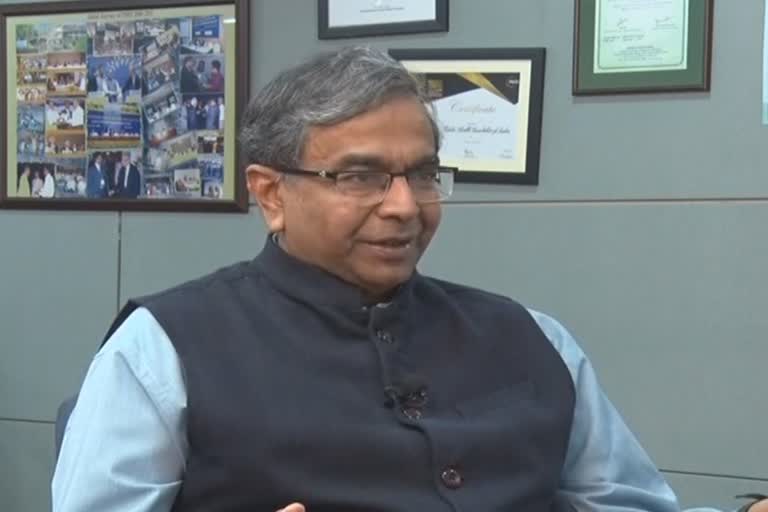New Delhi: A sudden outbreak of Novel Corona Virus in China that has shut down its major production centres and disrupted supply of active pharmaceuticals ingredients (APIs) and other raw materials to India and other countries has exposed the vulnerability of Indian Pharma industry that is largely dependent on foreign suppliers, but the crisis in China also presents an opportunity for India to strengthen its domestic production as a long term solution to the problem, said Dr K Srinath Reddy, an expert on public health issues.
“Since China went into shutdown, particularly in the region, in the province, where much of API is produced, we could not import it. And as a result, there is a great danger of running out of stock, our limited stocks are likely to be threatened,” said Dr K Srinath Reddy, President of Public Health Foundation of India.
India imports 60% of its requirement of Active Pharmaceuticals Ingredients (API), the key input material that goes into production of medicines, from China. And the outbreak of Covid-19 has shut major API production centres located in Wuhan in China. It has led to the possibility of Indian drug makers soon running out of their stock that is essential for maintaining steady supply of medicines in the market.
“We are importing from other countries but everywhere there is going to be a shortage because of the Chinese situation,” Dr Reddy told ETV Bharat.
“And we will not be able to supply generic drugs at the same prices as before. The API prices have gone up, I mean, they have doubled. The consequent impact on generic drugs is bound to be there once our API stocks are exhausted,” he said.
The Union government has maintained that there is no shortage of medicines in the market and the country and its officials were also keeping a watch on medicine prices in the retail market. However, the country has already faced shortage of sanitisers and face masks due to the panic created by the possibility of Coronavirus spreading in the country.
Dr K Srinath Reddy, who as a chairman of an expert group of Planning Commission on universal health coverage, had recommended that the country must develop self-sufficiency in the production of active pharmaceutical ingredients, says that the crisis in China should be taken as an opportunity to strengthen the public health system and pharmaceuticals industry in the country.
Read more: Govt raise excise duty on petrol, diesel by Rs 3 per litre
“In 2011, we had recommended that the country must develop self-sufficiency in manufacture of APIs which are basic ingredients for manufacture of drugs, including generic drugs. Secondly, we also said that public sector capacity must also be built up,” said Dr Reddy while talking about the challenges posed by the shutdown of API production centres in China.
He says that it is crucial for the country to reduce its dependency not only on foreign suppliers but also on private sector companies in the country because sometimes APIs and generic drugs will have to be produced under the compulsory licencing.
“The private sector companies are not ready to take it up. Now, we are seeing the consequences of not having protected our domestic API industry because over 60% of our APIs are imported from China,” he said.
Dr. Reddy, who has worked extensively on several experts group of the World Health Organisation (WHO), warns of the possibility of drug prices going up if the country is not able to resume sourcing of APIs from abroad.
“We were told in January that we had stocks lasting up to two months for some of the API's, of course, we have been trying to acquire from other countries as well. But it's likely that within another month or so, we will be in difficulty if we are not able to resume the imports,” he told ETV Bharat.
He, however, said that there is some hope as Wuhan has declared that it has discharged its last Corona patient and it will resume the production.
“Hopefully, the Chinese industry should also pick up and be able to supply to us, but that is not a long-term solution. The long-term solution is that we must develop our own industry,” advised Dr Reddy.
Impact of Chinese shutdown on global economy
Citing the publicly available data, Dr Reddy says that earlier estimate was that the outbreak of Novel Corona Virus in China will cause economic loss to the tune of $62 billion. He, however, says that the real extent of damage will only be known when the GDP data for January-March quarter for China will be available.
A Chinese shutdown has direct impact on Indian economy which has already entered a definite slowdown phase in last one year. India's GDP growth declined to just 4.7% in the third quarter of this fiscal, a six year low. Travel and trade restrictions around the globe has made it even more daunting for Prime Minister Narendra Modi's government to revive the economic activity in the country.
“We have seen how in a globalized economy, the kind of interdependence that has been created, can really draw the things out of gear, if something like this shuts down China or any other major part of the global economy, so there are bound to be disruptions,” Dr Reddy said to ETV Bharat.
(Article by Senior Journalist Krishnanand Tripathi)



